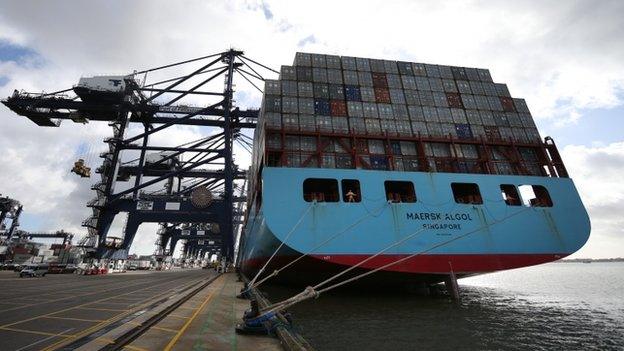Budget 2014: UK firms get tax relief and export boost
- Published

The government wants to double exports to £1 trillion by 2020
Help for firms to encourage investment and exports are among the measures for business announced by the chancellor.
The annual 100% tax allowance for investment has been doubled to £500,000 and will run to the end of 2015.
George Osborne said the increase meant the majority of UK businesses would get investment tax breaks.
The amount of government credit available to support overseas sales has also been doubled, to £3bn, and the rate charged on that credit cut.
Greater help
The government wants UK exports to reach £1 trillion by 2020, and for 100,000 more UK companies to be exporting by 2020.
"We're not going to have a secure economic future if Britain doesn't earn its way in the world," Mr Osborne said.
"We need our businesses to export more, build more, invest more and manufacture more."
The annual limit on business investment tax relief currently stands at £250,000, but was due to fall back to £25,000 from the beginning of 2015.
Loans available for foreign buyers to purchase goods and services from UK exporters will increase from £1.5bn to £3bn, said UK Trade and Investment (UKTI), the government department charged with increasing UK exports.
Interest rates on those finance packages will be cut to their lowest possible level.
"The government is working hard to help UK companies boost their exports," said UK trade minister Lord Livingston.
In addition, investment in the UKTI's Global Entrepreneur Programme will be extended by £2.4m over two years. The programme aims to attract start-ups to the UK.
'Greater clarity'
Mr Osborne also said manufacturing would benefit from a £7bn package to cut energy bills.
Changes to how fossil fuels are taxed under the Carbon Price Floor would mean savings for manufacturers, he said.
The Carbon Price Support rate will be capped at £18 per tonne of CO2 from 2016-2017 for the rest of the decade.
Compensation for the green Renewable Obligation and Feed-In tariffs worth almost £1bn will be introduced, and an existing tax compensation scheme for heavy industry will be extended until 2019-2020.
Manufacturers' body the EEF said the energy price caps "will translate into greater clarity for manufacturers' energy bills through to 2020".
"The chancellor has backed his words on the importance of manufacturing in rebalancing the economy and tackling climate change in a cost effective manner with concrete action," said Gareth Stace, head of climate and environment policy at EEF.
"This sends a clear signal that government recognises the serious competitiveness issues at stake from rising energy prices."
Sustainable energy industry body RenewableUK said the Carbon Price Floor cap would "chill the mood of some investors in clean energy projects".
"There will inevitably be a squeeze on the pot of money set aside to support renewables - the Levy Control Framework," said RenewableUK's director of policy, Dr Gordon Edge.
"This will limit the government's room for manoeuvre as it strives to meet its 2020 renewable energy target."